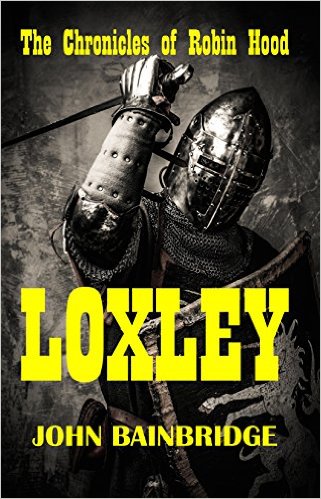I’m still thinking a lot about Robin Hood lately, even though I’ve completed my four book novel series The Chronicles of Robin Hood. The outlaw is such an essential British myth, that you can never quite get him out of your mind.
And Robin has a relevance to today, when the poor and dispossessed are still persecuted by the rich and powerful.
When you consider it, Robin Hood is quite a remarkable guy – with King Arthur one of the two essential British myths. For darned near a thousand years, the people of Britain, and then the citizens of the world, have been entertained by his exploits.
He reaches out and says something to us all to this day.
What’s the attraction?
Well, Robin Hood appeals perhaps to the rebel in all of us, the man who’s prepared to champion the poor and powerless against the uncaring rich and powerful. Mind you, if you read the original ballads he’s not quite so selfless. But it doesn’t matter. People need a champion and Robin Hood’s quite a good one.
I think it’s interesting that you could take a medieval peasant away from his plough, transport him through time and put him down in front of a television and let him watch Robin of Sherwood say, or Richard Greene in The Adventures of Robin Hood and he’d get the point. (Assuming he wasn’t overcome by technology or changes in the English language, of course. I frequently am!)
I have always enjoyed the tales of Robin Hood, and my novels Loxley, Wolfshead ,Villain and Legend, have been decades in the making.
It probably all started watching episodes of the Richard Greene series. Playing at Robin Hood was always the favourite game in our neighbourhood – in those happy days when children could make a longbow or wield a sword without social services coming round to take you into care as a potential menace to society.
Unlike so many children today, our lives were spent mostly in the great outdoors, where we would vanish for hours on end, building dens and taking massive treks across the countryside. The countryside where I lived became Sherwood Forest during these youthful expeditions.
In the 1980s, the whole myth received a tremendous boost with Richard Carpenter’s imaginative remake Robin of Sherwood, which took the story in such interesting new directions. It thrills me that so many people were enthused by this and other retellings.
In many ways, in the years since my first encounter with the man in Lincoln Green, I’ve led a rebellious life.
I’m sure it all started under the subversive influence of Robin Hood!
I spent a year living – mostly alone – in a wood back in the 1980s. Park Wood, at Spitchwick on Dartmoor, just across the River Dart from Holne Chase, an old Norman hunting ground. It gave me interesting thoughts as to just how medieval outlaws lived. There was the added spice that I was breaking laws for the common good, and I’m proud of that.
I’d practised archery over the years, and learned many of the arts of fighting. I took up fencing at university. I’d already practised a variety of martial arts. One or two of these skills I’ve had to use a few times – though I deplore violence.
Every writer on Robin Hood takes a different tack. Some of my fellow authors portray him as a saint or sinner, or, like me, a mixture of both. Outlaws, wolfsheads, come to the hidden places in the forest for various reasons in my books. Mostly through injustice.
Some writers prefer Robin in Barnsdale rather than Sherwood. I chose Sherwood out of sentimentality, I guess. In fact many parts of England have Robin Hood legends, something I’ve addressed in the final novel in the series, Legend.
In some versions, the villains, such as Guy of Gisborne and the Sheriff are out and out rogues.My versions aren’t quite as clear cut as that. And I’ve been kinder to Prince (actually Count) John than a lot of other writers – though I made him a bit more ruthless when he becomes king, though I still prefer him to the odious Richard the Lionheart.
My Robin questions the hierarchy of the society of his time much more than most Robins. As we should all do, though these are novels and not political tracts. But if Robin Hood isn’t a rebel fighting for the poor and against the unfairness of his society then he is nothing.
There have been thousands of interpretations and no doubt there are thousands still to come. We all have our own vision of Robin Hood. It’s encouraging that the present generation is being given inspiration by the legend of the old wolfshead.
I’ve finished the saga, but that doesn’t mean it’s the end of it. I deliberately left the series open for a sequel. I may return to it, though at present I’m writing the next Sean Miller thriller, and after that the next in my series about William Quest, the Victorian vigilante – William Quest is himself a kind of Robin Hood, even though he fights in the Victorian rookeries rather than Sherwood Forest. I’ve written three books about Quest so far, The Shadow of William Quest, Deadly Quest and Dark Shadow.
I’ve also got an idea for another historical tale, which I might write next year, a story set in England in the 17th century.
A big thank you to everyone who’s bought one of my books. It means a lot! And another thank you if you’ve made a kind comment or left a reader review on the purchase site.
And please do tell your friends about the books…
All of my novels are available in paperback and as Ebooks on Kindle. Here’s the link…